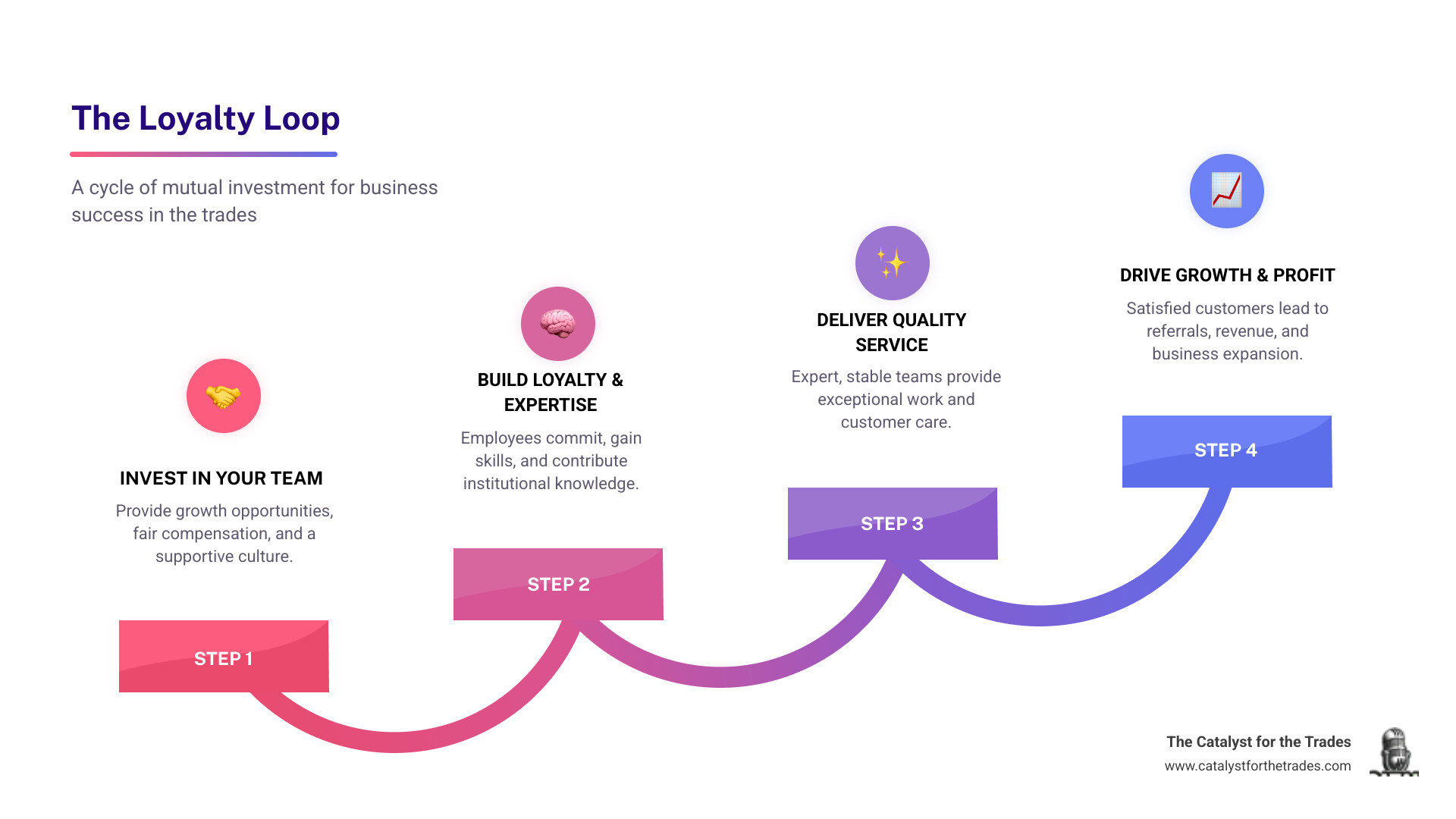Discover business acumen: core components, traits of leaders, development steps & metrics to boost decision-making and scale success.

The Loyalty Loop: Building a Dedicated Workforce
Understanding Employee Loyalty in the Trades
Employee loyalty is an emotional commitment from your people to stay with your company long-term. They are invested in your mission and success, not just collecting a paycheck. Loyal employees go the extra mile, speak positively about your company, and aren't looking for the next job. This matters because they cost less to retain, perform better, and create stable teams that deliver superior customer service.
In the home services industry, losing good technicians is a constant challenge. With the median employee tenure at just 3.9 years, turnover is costly. Each departure means losing valuable knowledge, customer relationships, and thousands in replacement costs.
Fortunately, loyalty isn't about luck or expensive perks. It's about building the Loyalty Loop: a cycle where you invest in your people, and they invest back in your business. Getting this right leads to higher retention, happier customers, and a more profitable business.
Research shows that 79% of employees who leave cite a lack of appreciation, and 94% would stay if their employer invested in their development. These are calls for respect, recognition, and growth. For trades businesses, this loyalty creates stability, which builds expertise and leads to satisfied customers who refer more business. That's the loop.

What is Employee Loyalty and Why Does It Matter for the Trades?
Think of your best technician—the one who knows customers by name and can troubleshoot any problem. That's employee loyalty in action. It's an emotional connection where your people care about the company's success and choose to stay, even when other offers arise.
For trades businesses that solve urgent customer problems, a reliable team is essential. Loyal employees are the foundation for productivity, quality, and customer trust. Given the significant business costs of replacing employees, retention is one of the smartest business decisions you can make. For strategies on attracting talent, see our guide on Talent Acquisition.
The Real Cost of Turnover
When a skilled technician leaves, the costs are immense.
Research shows it costs about 20% of an employee's salary to replace them, with average hiring costs around $4,129—and much more for skilled trades. With median employee tenure declining to 3.9 years, businesses without a retention strategy are stuck in a costly hiring loop.
The hidden costs are even greater. When an experienced team member leaves, they take institutional knowledge, customer relationships, and years of expertise with them. This disrupts workflows, reduces efficiency, and forces the remaining team to pick up the slack, which can quickly tank morale and lead to more departures.
Benefits of a Loyal Workforce
When you get employee loyalty right, your business transforms. The benefits are game-changing:
- Increased Profitability: Loyal, experienced employees are faster, more efficient, and make fewer costly mistakes. Their initiative and problem-solving skills directly boost your bottom line.
- Stronger Reputation: Happy employees become your best brand ambassadors, strengthening your community reputation and attracting both new customers and top talent.
- Better Customer Retention: Loyal techs build lasting relationships with customers, creating the trust that drives repeat business and valuable referrals.
- Greater Resilience: During challenges, loyal employees don't bail. They roll up their sleeves and work with you to find solutions, providing stability when it matters most.
- Thriving Culture: Loyalty is contagious. A committed team fosters a positive, collaborative environment that encourages innovation and makes work more enjoyable.
Employee loyalty isn't a soft metric; it's a strategic advantage for building a sustainable, profitable business.
The Core Drivers: What Makes an Employee Loyal?
Employee loyalty isn't accidental or bought with flashy perks. It's built on fundamentals: how you lead, whether people see a future, and if they feel heard. Getting these core elements right is the key to earning loyalty.

Leadership and a People-First Culture
People don't leave companies; they leave managers. Your leadership sets the tone. When leaders genuinely care, show appreciation, and prioritize their people, loyalty grows. Yet, a significant trust gap exists, as many employees doubt leaders will choose well-being over profit.
In the trades, people-first leadership means treating technicians as professionals, not just numbers. It requires showing genuine appreciation, as 79% of employees who leave cite a lack of it as the main reason. It also means creating psychological safety, where team members feel comfortable speaking up, suggesting improvements, or admitting mistakes without fear.
Finally, you must remove toxic individuals who poison the culture, no matter how skilled they are. This servant leadership approach isn't soft; it's strategic. It empowers your team to do their best work, building a foundation of trust and commitment. For real-world examples, see How to Lead, Serve, and Grow in the Trades with Raul Rodriguez.
Investment in Growth and Development
A staggering 94% of employees would stay with a company that invests in their professional development. This is a retention goldmine. Technicians want to know there's a path forward beyond running the same service calls.
This investment doesn't have to be expensive. It can include:
- Training opportunities for new equipment and techniques.
- Clear career paths showing how an apprentice can advance to a lead tech or supervisor.
- Mentorship programs that pair experienced techs with newer team members, transferring knowledge and building culture.
Prioritizing skill advancement shows you're invested in their future. When you invest in their growth, they invest their loyalty back into your business. Learn more in The Future of Leadership: How to Build a Team That Drives Growth.
Fostering Strong Employee Loyalty Through Communication
Great benefits and training mean little without strong communication. Open, honest, and consistent communication is the bedrock of a loyal team.
This requires establishing open feedback loops where your team can share ideas and concerns without fear. It also means transparency about the business's direction and challenges. Being honest, even with bad news, builds trust.
Crucially, you must practice active listening—hearing what your people say and acting on their input. Regular one-on-ones are invaluable for addressing small issues before they grow and providing coaching. When communication flows freely, trust deepens, and loyalty follows. For more on this, check out How to Win in the Trades: Recruitment, AI, and Trust with Mike Disney.
Actionable Strategies for Building Employee Loyalty
Understanding the 'why' of employee loyalty is the first step. Now, let's focus on the 'how' with practical strategies you can implement in your trades business today.

Create a Culture of Recognition
Most people don't quit over hard work; they quit because they feel undervalued. In fact, 79% of employees who leave cite lack of appreciation as their primary reason. According to Great Place to Work, recognition is the single most important driver of great work and employee loyalty.
Make appreciation a daily habit, not an annual event. This can include:
- Peer-to-peer recognition programs for team shout-outs.
- Performance bonuses tied to achievements or customer satisfaction.
- Public recognition during team meetings or in a company newsletter.
- Celebrating milestones like work anniversaries and certifications.
When people feel genuinely appreciated, they are more engaged, productive, and loyal. For more insights, see A study on creating a culture of recognition and learn how it applies to sales culture with Darren Tyler Dixon.
Empower Your Team with Autonomy and Trust
Nobody likes being micromanaged. Your technicians are skilled professionals who need your trust, not constant oversight. Companies with engaged employees—who are empowered to make decisions—have a 31% lower turnover rate.
Empowerment in practice means giving your team control over their work. This could involve letting plumbers manage their own schedules or allowing technicians to solve customer issues on the spot without seeking approval for every small decision. Where possible, offering flexible work arrangements can also demonstrate trust. When you empower your team, you send a clear message: "We trust you." That trust is returned with initiative, performance, and loyalty. See how Trey McWilliams Balances Big Growth with People-First Leadership.
Establish a Robust Onboarding Program
The first few weeks on the job are critical for new hires to decide if they've made the right choice. A strong onboarding program is your first opportunity to build employee loyalty.
An effective program should:
- Set clear expectations about the role, performance metrics, and company contribution.
- Use a buddy system, pairing new hires with experienced team members for guidance.
- Facilitate cultural immersion by sharing your company's mission and values.
- Provide foundational training on technical skills, company processes, and customer service standards.
A well-designed onboarding process makes new employees feel welcome, prepared, and valued from day one, paying dividends in long-term loyalty. Hear more from Mike Disney on Building Trust, Recruiting Top Talent, Winning in the Trades.
Measuring and Maintaining the Loyalty Loop
Building employee loyalty is an ongoing process, not a one-time project. Like maintaining an HVAC system, it requires regular check-ups and adjustments. To ensure your efforts are effective, you must measure what's working and refine your approach to keep the Loyalty Loop strong.
Key Metrics for Tracking Employee Loyalty
While loyalty is an emotional connection, its impact can be tracked through concrete metrics that tell the story of your team's commitment.
- Employee Net Promoter Score (eNPS): Ask, "On a scale of 0-10, how likely are you to recommend working here?" This simple question categorizes employees as Promoters (9-10), Passives (7-8), or Detractors (0-6). Your score is the percentage of Promoters minus the percentage of Detractors. A score above 40 is considered excellent.
- Turnover and Retention Rates: These are your most direct indicators. High voluntary turnover is a red flag, while high retention shows you're doing things right. Aim for annual turnover below 5%.
- Engagement Survey Results: Regular surveys on job satisfaction, work-life balance, and feelings of appreciation provide deep insights into what drives loyalty in your organization.
- Stay Interviews: Instead of exit interviews, ask your best current employees why they choose to stay. This proactive approach helps you identify and reinforce what you're doing right.
This table summarizes how these metrics provide a complete picture:
| Metric | What it Measures | Goal |
|---|---|---|
| Employee Net Promoter Score (eNPS) | Likelihood of employees recommending our company | >40 (Excellent) |
| Turnover Rate | Percentage of employees leaving over a period | <5% (Good) |
| Retention Rate | Percentage of employees remaining over a period | >95% (Excellent) |
| Engagement Scores | Employee satisfaction, motivation, and commitment | Consistently high scores across all areas |
| Absenteeism Rate | Frequency of unscheduled employee absences | Low and stable, declining over time |
| Stay Interview Insights | Reasons employees choose to remain with the company | Identify and leverage positive loyalty drivers |
Using Technology to Support Your Efforts
Technology is a powerful ally in building and maintaining employee loyalty. The right tools can streamline processes and provide valuable insights.
- HR Software (HRIS/HRM): Automates administrative tasks like payroll and benefits, freeing up time to focus on your people.
- Communication Platforms: Apps like Slack or dedicated internal systems keep your team connected and informed, especially those in the field.
- Training Management Systems (LMS): Help deliver and track professional development, showing your commitment to growth. 94% of employees value this investment.
- Performance and Listening Tools: These platforms help monitor performance for timely feedback and use pulse surveys to gather continuous feedback, helping you understand what keeps employees engaged.
By leveraging technology, you improve the human element of your business, creating a supportive environment where loyalty can thrive. For more on this, check out Unleashing Success: Trey McWilliams on Mastering Growth and Leadership in Home Services.
Frequently Asked Questions about Employee Loyalty
Building employee loyalty raises common questions for trades business owners. Here are answers to some of the most frequent ones.
What's the difference between employee loyalty and employee satisfaction?
This distinction is critical. Employee satisfaction is transactional and short-term. A satisfied employee is happy with their current pay and conditions but might leave tomorrow for a slightly better offer.
Employee loyalty is an emotional, long-term commitment. A loyal employee believes in your company's mission, feels connected to the team, and is invested in its success. They work with you, not just for you, and are more likely to stay through challenges. In short, satisfaction is about the 'what' (pay, perks), while loyalty is about the 'why' (mission, culture, belonging).
How long does it take to build employee loyalty?
There's no magic timeline. Building employee loyalty is an ongoing process, like any meaningful relationship. It's earned through consistent actions over time, not grand gestures.
You can see early signs of connection within a few months through a strong onboarding program and regular recognition. However, the deep, enduring loyalty that withstands competitive offers develops over years. It's the cumulative effect of consistently showing appreciation, providing mentorship, and being transparent. Think of it as compound interest: small, regular investments in your team yield powerful returns over time.
Can a small business with a limited budget still build strong employee loyalty?
Absolutely. In fact, small businesses often have an advantage. Employee loyalty is driven more by culture and respect than by expensive perks.
As a small business, you can offer what large corporations struggle with: genuine personal connection. The strategies that build the most loyalty are often low-cost but high-impact:
- Heartfelt, personal recognition from an owner means more than a generic corporate memo.
- Real relationships where leaders know their team members as individuals.
- Meaningful growth opportunities, such as learning a new skill or leading a project.
- A unique, positive culture that you can shape directly.
It's not about how much you spend; it's about showing you genuinely care. That authentic investment is what earns loyalty in return.
Conclusion: Your People Are Your Greatest Asset

We've explored what employee loyalty is, why it's critical for trades businesses, and how to build it. The core takeaway is simple: loyalty isn't luck; it's the result of the Loyalty Loop—a cycle where you invest in your people, and they invest back in your business.
When you lead with intention, create a culture of value, and invest in your team's growth, your business becomes stronger, more stable, and more profitable. Your best people stay, deliver exceptional work, and become advocates for your company.
In the home services industry, your team is your greatest asset. They are the face of your brand and the heart of your operation. By committing to strategies like recognition, empowerment, growth, and open communication, you're not just reducing turnover. You're building a thriving business where people love to work and success is a shared journey.
Invest in your people wisely. When you do, they will invest their loyalty right back into helping your business succeed.
Ready to learn more strategies for growth and leadership in the trades? Visit us at The Catalyst for the Trades and join us on The Catalyst for the Trades podcast.

Discover how leading home‑service companies are leveraging AI, subscription models, and digital‑first strategies.
Learn why private equity, automation, and customer‑centric tech are reshaping the trades.
Episodes you may like


Lead your crew to victory! Master essential contractor leadership strategies for project success, safety, and team empowerment.

Harness real-time data with cortex pulse analytics. Get AI-driven insights, detect issues instantly, and make smarter business decisions.
.png)




